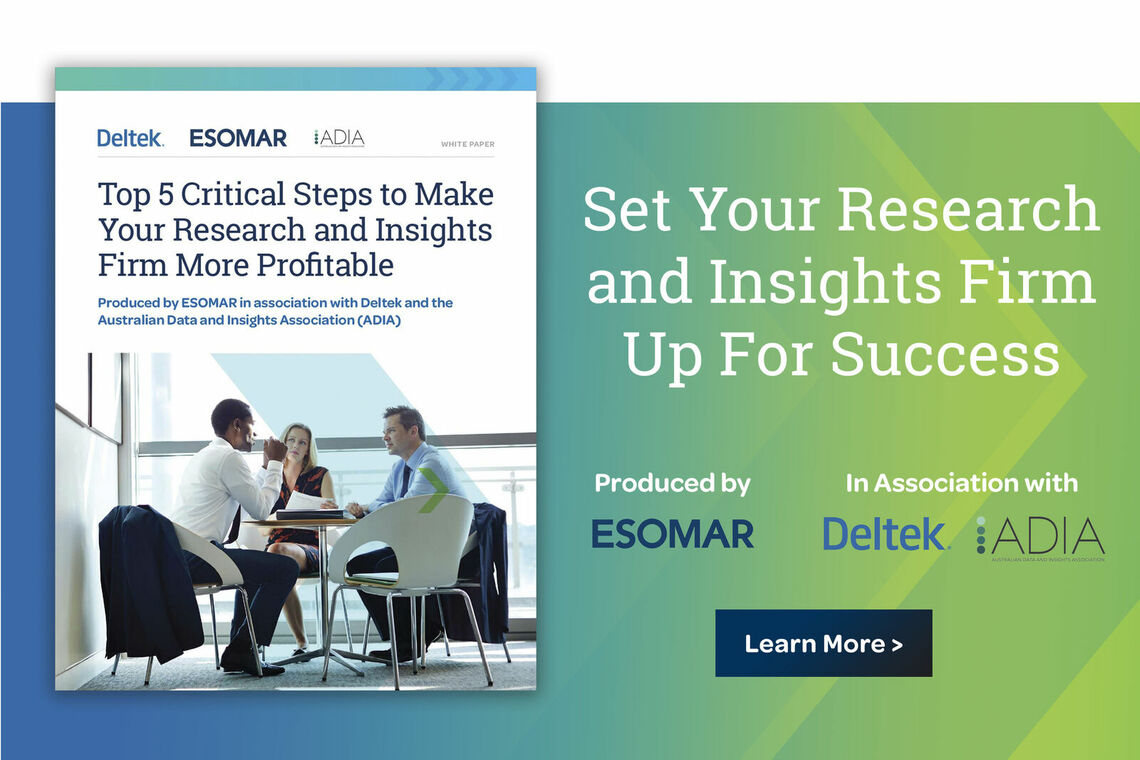Top five critical steps to make your research and insights firm more profitable
What distinguishes the top performing research agencies from the rest?


What distinguishes the top performing research agencies from the rest? Is it their management, their marketing, or the fact that they have picked the right technology strategy to succeed in the market?
Clearly, technology can drive a competitive advantage. According to ESOMAR’s latest Global Market Research Report, whilst the traditional market research and insights industry shrank by 3% in 2020 due to the pandemic, the technology-enabled sector grew by a remarkable 10%.
The lockdown and tighter budgets forced clients to turn to technology to get the insights they needed faster and cheaper, and many tech-enabled companies have prospered. This, however, is just part of the story.
To find out which practices help companies to flourish in uncertain times, we talked to members of ESOMAR and the Australian Data and Insights Association (ADIA), including winners of awards for innovation and operational excellence.
The interviews uncovered five steps that are essential to boosting resilience and profitability. They are published in a White Paper which has been produced in association with ADIA and Deltek, a global provider of enterprise software and information solutions.
What are the steps identified in the White Paper interviews that help research companies thrive?
Step #1: Enhance collaboration amongst remote teams
Having an effective infrastructure and working practices for distance teams is just part of the recipe for success. Jan Shury, CEO of London-based IFF Research, underscores the use of project-based chat channels and zoom rooms to improve communication, plus the vital ingredient of trust and understanding to foster productive relationships.
Step #2: Proactively manage projects every step of the way to drive business success
COVID-19 has meant more assignments for McNair Yellow Square in Sydney which does governmental work including research for health, housing, and education, in addition to commercial projects. Project management software helps the company to maintain end-to-end financial control whilst attracting return clients through high quality standards.
Step #3: Set the right digital strategy
Agencies are more likely to succeed if their strategy includes offering dynamic, digital services which can predict emerging trends and help clients understand how consumer habits are evolving. According to Garreth Chandler, CEO of the Evolved Group, it is also vital to ensure that clients feel comfortable about using new sources of information.
Step #4: Optimise your resources, talent, and expertise
The pandemic has created enormous pressure to make the most of reduced budgets when navigating an uncertain recovery. Darren Lewis of global boutique Kadence International, says the company keeps as much as possible in-house to uphold the quality of their work. The firm also works with specialists around the world to manage and maximise human and technology resources.
Step #5: Create added value for your customers and build your brand
Researchers need to think more about how to make research impactful and interesting, and help clients apply it to their decision making, says Lucy Davison, founder of Keen as Mustard in London. Researchers need to engage and delight not only their direct clients but a range of other decision makers in the company.
To read more about the five steps that will help you elevate your company’s performance and create greater value for your customers.
Kathy Joe
Research World Editorial Consultant at EsomarKathy Joe served for many years as Director of International Standards and Public Affairs at ESOMAR before retiring in 2016. She currently still works periodically for ESOMAR as its Editorial Consultant for Research World.
Prior to working for ESOMAR, Kathy worked at The Economist and Euromoney and gained a BSc Hons in Politics and Sociology from the University of Southampton in the UK.
With a passion for research and insights and long experience in working with global teams to formulate editorial content, privacy policies and professional standards, she has worked with research professionals from around the world on far-ranging topics including innovation and best practice in consumer insights, knowledge and strategy.
As ESOMAR Director of International Standards, Kathy led the development and promotion of global research codes and privacy guidelines.
She volunteers for projects with NGOs such as Amnesty International and is a Board Member and Secretary of Dance Connects.


